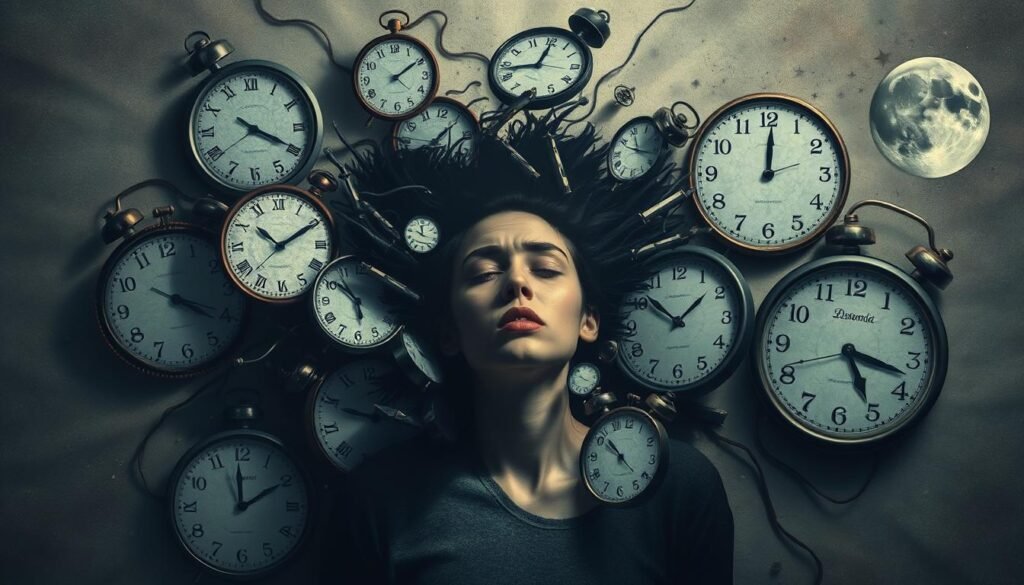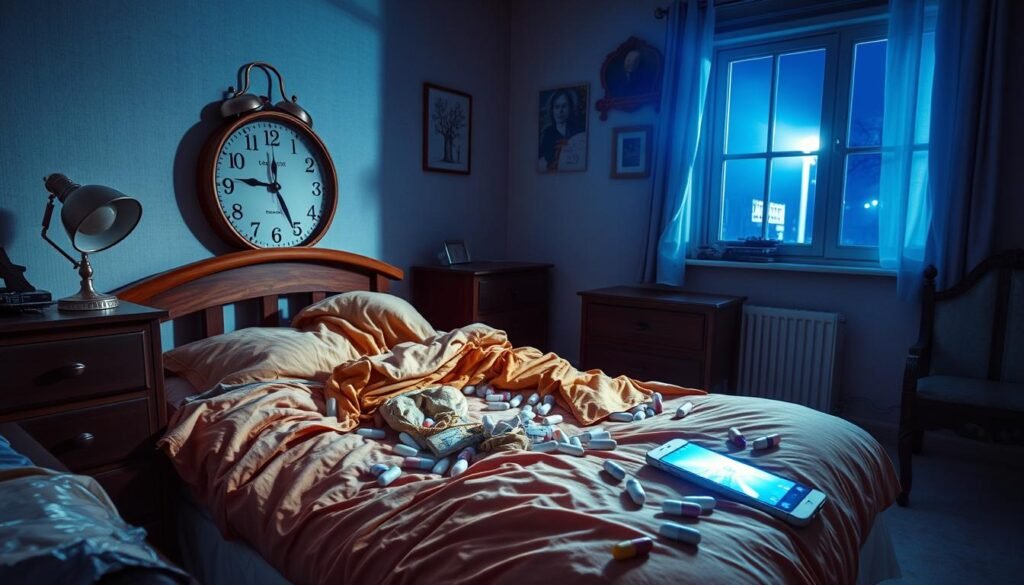Almost 35% of people have trouble starting or keeping sleep over three nights a week. This high figure shows how common sleep issues are, particularly the differences between dyssomnia and insomnia. Knowing more about these conditions is key for better sleep and life quality.
Insomnia and dyssomnia might seem similar, but they’re actually different. Insomnia means you find it hard to fall asleep, stay asleep, or get quality sleep. This leads to problems during the day. Dyssomnia includes various sleep problems that cause too much sleepiness or change sleep patterns. We’ll explore insomnia and dyssomnia more, looking at their symptoms, causes, and how to handle them. Understanding these can help tackle sleep problems better.
Key Takeaways
- 34.5% of people face sleep initiation or maintenance issues regularly.
- Insomnia and dyssomnia are two distinct types of sleep disorders.
- Understanding the symptoms of insomnia is crucial for effective management.
- There is often a significant overlap in the causes of both conditions.
- Awareness of one’s sleep patterns can aid in early detection and treatment.
Understanding Sleep Disorders
Sleep disorders disrupt normal sleep patterns. They significantly impact overall sleep health and daily activities. *Sleep disturbances* are common signs, affecting sleep quality and quantity.
Dyssomnia includes various sleep issues like trouble falling or staying asleep, and excessive daytime sleepiness. Stress, medical problems, and lifestyle choices all play a role. People with these conditions often feel unrested after waking up.
Intrinsic and extrinsic dyssomnias are two types, based on what causes them. Issues like insomnia, narcolepsy, and sleep apnea are intrinsic. Extrinsic disturbances are caused by lifestyle and environment.
It’s important to distinguish between primary and secondary sleep disorders. Primary disorders stand alone, while secondary ones stem from health conditions like depression. Knowing the differences between insomnia and sleep apnea is key for good *sleep health*. Find out more in this informative guide.
There are over 80 sleep disorders. Identifying dyssomnia causes and types is crucial. Symptoms include daytime sleepiness and sleep disruptions. Diagnosing involves interviews, medical history, and sometimes polysomnograms.
Treatment options vary from cognitive behavioral therapy to improving sleep hygiene. These approaches can greatly enhance sleep health and daily life quality.
In conclusion, understanding sleep disorders is vital. Insights into conditions like insomnia and dyssomnia are critical for finding effective treatments.
What is Insomnia?
Insomnia is a sleep disorder that makes it hard to fall asleep, stay asleep, or get restful sleep. People with insomnia often face many insomnia symptoms. These issues can seriously disrupt their day-to-day life and the quality of their sleep.
Symptoms of Insomnia
Common insomnia symptoms can include:
- Difficulty falling asleep
- Frequent awakenings during the night
- Waking up too early and unable to return to sleep
- Feeling tired upon waking
- Daytime fatigue or sleepiness
- Cognitive impairments, such as concentration issues
These symptoms can cause a lot of stress and interfere with daily life. For some, chronic insomnia becomes a long-term problem. It weaves into their lives, affected by stress and lifestyle.
Types of Insomnia
There are several types of insomnia, including:
- Acute Insomnia: This is often short-term, triggered by stress or changes in life. It usually doesn’t last more than a few weeks.
- Chronic Insomnia: This type happens when sleep problems occur at least three nights a week for three months or longer. It’s often linked to health issues.
- Comorbid Insomnia: This insomnia happens alongside other conditions, like depression or asthma. These conditions can make it harder to sleep.
Knowing the different types of insomnia helps in finding the right treatment. It also helps understand what changes are needed to sleep better.
| Type of Insomnia | Duration | Potential Causes |
|---|---|---|
| Acute Insomnia | Short-term (days to weeks) | Stress, significant life events |
| Chronic Insomnia | Long-term (months to years) | Health conditions, medications |
| Comorbid Insomnia | Varies | Depression, anxiety, medical issues |
What is Dyssomnia?
Dyssomnia is a group of sleep disorders affecting how much and how well you sleep. People with dyssomnia may face a range of dyssomnia symptoms. These symptoms can upset their daily routine and health. They often feel very sleepy during the day, which makes daily tasks hard.
Symptoms of Dyssomnia
Common dyssomnia symptoms include:
- Difficulty falling asleep at night
- Frequent awakenings during the night
- Waking up earlier than desired
- Feeling unrested despite spending enough time in bed
- Excessive daytime sleepiness, affecting focus and work
Factors like stress, discomfort, or stimulant use can cause these symptoms. Knowing them helps diagnose and understand how the disorder affects daily life.
Common Types of Dyssomnia
Common types of dyssomnia include:
| Type of Dyssomnia | Description |
|---|---|
| Insomnia | The most common type, causing trouble starting or keeping sleep. |
| Narcolepsy | A neurological issue leading to too much daytime sleep and sudden sleep episodes. |
| Sleep Apnea | A serious problem where breathing stops and starts while sleeping. |
| Restless Legs Syndrome | A need to move the legs due to uncomfortable feelings, mostly at night. |
| Circadian Rhythm Disorders | Problems with the natural sleep-wake cycle that cause sleep issues. |
It’s important to recognize these common types of dyssomnia. Each one brings different challenges to sleep quality and health. Those with symptoms should see a doctor for a correct diagnosis and treatment options. For more information about these disorders, visit this resource.

Dyssomnia vs Insomnia: Key Differences
It’s key to grasp the difference between dyssomnia and insomnia for proper treatment. Dyssomnia covers various sleeping issues, whereas insomnia points to trouble in either falling or staying asleep. The diagnostic differences are crucial for correct evaluation.
Both disorders impact sleep quality, affecting health greatly. With 50 to 70 million American adults suffering from sleep troubles, the issue is widespread. Insomnia might be short or long-term. Dyssomnia includes intrinsic disorders, extrinsic disorders, and issues with the body’s clock.
Insomnia is known for:
- Difficulty falling asleep
- Waking up often at night
- Waking up too early
- Feeling tired during the day
Dyssomnia symptoms, however, depend on the specific condition. Restless legs syndrome (RLS) can cause leg twitches, while sleep apnea can interrupt breathing.
The sleep quality comparison between these shows different night experiences. Insomnia often links to mental stress, while dyssomnia might stem from physical sleep disturbances.
To diagnose dyssomnia, doctors may use sleep studies to monitor brain activity and other signs. Insomnia diagnosis usually depends on what the patient says about their sleep issues.
Understanding the differences between dyssomnia and insomnia helps in knowing their unique impacts. This insight leads to customized treatments that best address individual needs.
Causes and Risk Factors
It’s key to know what causes sleep problems and what increases the risk. Insomnia and dyssomnia come from different places but both affect wellbeing deeply.
Common Causes of Insomnia
Many things can cause insomnia. Stress from jobs, personal battles, or big life changes is a huge factor. Then, things like noise, how warm or cool the room is, and how much light there is can make it hard to sleep. Health issues, like being overweight, having high blood pressure, or breathing problems, add to the trouble. Age also plays a role, with about 30% of adults having sleep problems, especially those over 60. For women, hormonal shifts during their period or menopause often lead to insomnia.
Common Causes of Dyssomnia
Dyssomnia comes from different issues. Genes might make someone more likely to have it, and things in our surroundings can make it worse. Health problems like chronic pain and restless legs syndrome make good sleep hard. Then, factors like age, how we live our lives, and mental health conditions add risk. For kids, sleep can be tough, with nearly 28% of babies not sleeping well and around 29% of children dealing with sleepwalking or nightmares. This shows how different reasons can mix and cause sleep problems.

Treatment Approaches for Insomnia
Dealing with insomnia means using both medicine and other strategies. It’s key to know the different treatment for insomnia options. This knowledge allows people to choose the best ways to manage their sleep issues.
Medications for Insomnia
Medicines are important in treating people with sleep disorders. The main types of these medicines include:
| Medication Type | Examples | Effectiveness | Risks |
|---|---|---|---|
| Benzodiazepines | Diazepam, Lorazepam | Effective short-term | Dependency, withdrawal symptoms |
| Non-benzodiazepine Hypnotics | Zolpidem, Eszopiclone | Commonly prescribed | Next-day drowsiness, complex sleep behaviors |
| Antidepressants | Doxepin, Trazodone | Helpful for patients with depression | Weight gain, sedation |
| Over-the-Counter | Diphenhydramine, Melatonin | Can be beneficial | Tolerance over time, next-day sedation |
Talking to healthcare providers is crucial. They help decide if these insomnia medications are right for you.
Cognitive Behavioral Therapy for Insomnia (CBT-I)
CBT-I is an effective method that doesn’t involve drugs. It focuses on:
- Behavioral Techniques: Modifying habits to improve sleep hygiene.
- Cognitive Restructuring: Challenging and changing problematic thoughts regarding sleep.
- Sleep Restriction: Limiting time in bed to enhance sleep drive.
Research shows that CBT-I really improves sleep quality and length. It’s often the best option for dealing with insomnia over time. By using CBT-I, patients not only fight insomnia but also boost their overall well-being.

For insomnia caused by other health issues, patients should look into research articles. There, they can find many treatment ideas.
Treatment Approaches for Dyssomnia
Treating dyssomnia starts by looking closely at each person’s unique situation. Sleep hygiene is very important in dyssomnia care. There are also targeted treatments for the different causes and symptoms of dyssomnia.
Sleep Hygiene Improvements
Improving sleep hygiene can help ease dyssomnia symptoms. Important habits include:
- Maintaining a regular sleep schedule, sleeping and waking up at the same time each day.
- Ensuring a comfortable sleep area, keeping the room dark, cool, and quiet.
- Avoiding big meals, caffeine, and alcohol before bedtime.
- Doing calming activities before bed, like reading or meditating.
These sleep hygiene changes can make sleeping easier, helping manage dyssomnia.
Specific Treatments for Different Types of Dyssomnia
There are special treatments for different dyssomnia types. CPAP machines help those with sleep apnea breathe smoothly at night. For people with narcolepsy, certain medications can make them more alert during the day.
Cognitive Behavioral Therapy (CBT) is also a go-to method for primary sleep disorders. It changes sleep-disrupting thoughts and actions. For circadian rhythm issues, bright light therapy or dark therapy can reset the internal clock.
Treatment plans are made to fit each individual. They might use various methods. It’s key to keep checking and tweaking these plans to find what works best.
| Type of Dyssomnia | Treatment Options |
|---|---|
| Insomnia | Sleep hygiene improvements, Cognitive Behavioral Therapy (CBT) |
| Sleep Apnea | Continuous Positive Airway Pressure (CPAP), lifestyle changes |
| Narcolepsy | Medications for alertness, lifestyle modifications |
| Restless Legs Syndrome | Medication, iron supplements, lifestyle adjustments |
Managing Sleep Disorders Effectively
Dealing with sleep disorders can be tough. It’s because there are many symptoms and causes to look out for. Making positive lifestyle changes can really help improve sleep. These small tweaks to your daily life can make a big difference in how well you sleep.
Lifestyle Changes
To sleep better, try making some changes to your lifestyle. Here are a few tips:
- Balanced Nutrition: Eating lots of fruits, veggies, grains, and lean proteins can help you sleep better.
- Regular Physical Activity: Working out regularly makes it easier to fall asleep and sleep more deeply.
- Mindfulness and Relaxation Techniques: Doing things like meditation and yoga can lower stress and lead to better sleep.
- Consistent Sleep Schedule: Sleeping and waking up at the same time every day keeps your internal clock steady.
These changes can really help with sleep disorders. They improve both your body and mind.
When to Seek Professional Help
It’s important to know when to get help for sleep problems. Here are some signs:
- Persistent sleep issues that disrupt your day.
- Feeling too sleepy during the day, which affects your social and work life.
- Doing things like sleepwalking or sleep talking.
- Having trouble focusing or shifting moods because of bad sleep.
If you have these issues, seeing a sleep specialist is a smart move. They can figure out what’s going on and create a plan just for you. Working together with a specialist can lead to much better sleep.
| Strategy | Benefit |
|---|---|
| Balanced Nutrition | Enhances mood and energy, promoting better sleep quality. |
| Regular Physical Activity | Helps in falling asleep faster and supports deeper sleep. |
| Mindfulness Techniques | Reduces anxiety and stress, leading to improved sleep. |
| Consistent Sleep Schedule | Regulates the body’s internal clock, improving sleep consistency. |
Conclusion
Knowing the difference between dyssomnia and insomnia is key for understanding how they affect our lives and minds. Dyssomnia covers many conditions, including insomnia and hypersomnia, showing that sleep problems can touch anyone. Getting deep into dyssomnia vs insomnia helps us talk better with doctors.
The signs of dyssomnia, like trouble sleeping or feeling tired during the day, show why we need to know more about sleep disorders. If you face these issues, it’s smart to get help. Treatments like cognitive behavioral therapy and changing your routine can really improve your sleep and health.
Raising awareness about sleep problems like dyssomnia encourages us to look after our sleep health. With the right help, better sleep isn’t just a dream, it leads to better health. Understanding the complex nature of sleep disorders allows us to take control of our sleep, bettering our lives.